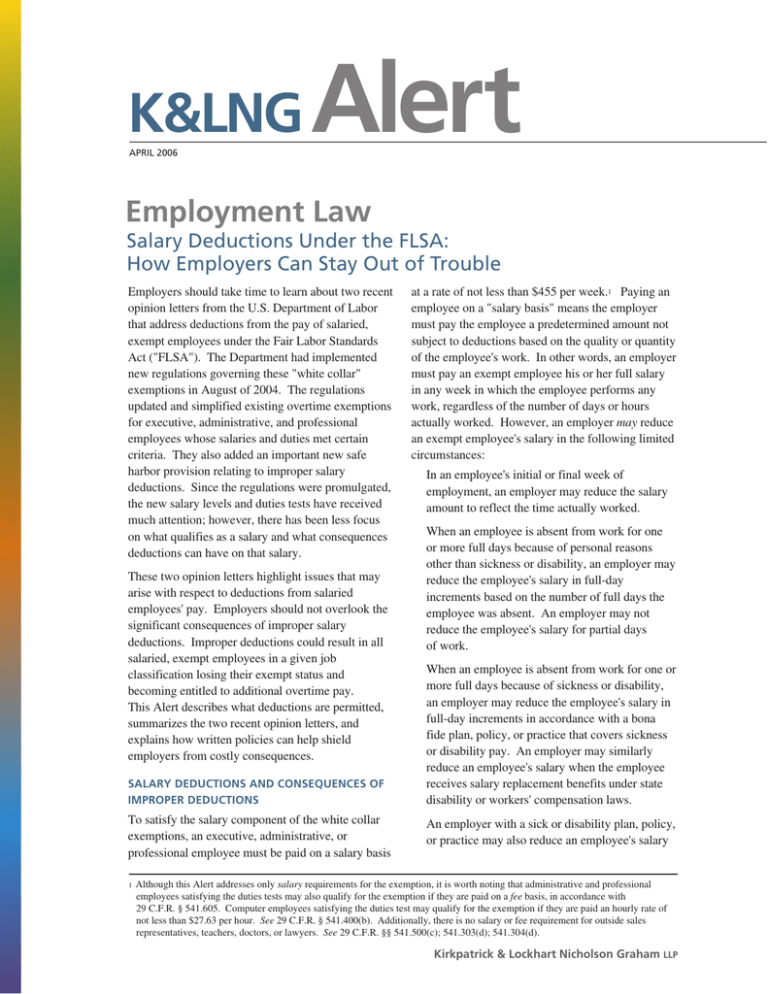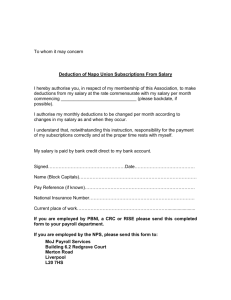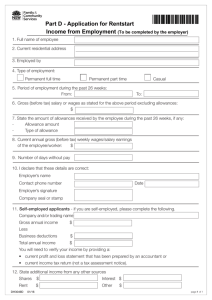
K&LNG
APRIL 2006
Alert
Employment Law
Salary Deductions Under the FLSA:
How Employers Can Stay Out of Trouble
at a rate of not less than $455 per week.1 Paying an
employee on a "salary basis" means the employer
must pay the employee a predetermined amount not
subject to deductions based on the quality or quantity
of the employee's work. In other words, an employer
must pay an exempt employee his or her full salary
in any week in which the employee performs any
work, regardless of the number of days or hours
actually worked. However, an employer may reduce
an exempt employee's salary in the following limited
circumstances:
Employers should take time to learn about two recent
opinion letters from the U.S. Department of Labor
that address deductions from the pay of salaried,
exempt employees under the Fair Labor Standards
Act ("FLSA"). The Department had implemented
new regulations governing these "white collar"
exemptions in August of 2004. The regulations
updated and simplified existing overtime exemptions
for executive, administrative, and professional
employees whose salaries and duties met certain
criteria. They also added an important new safe
harbor provision relating to improper salary
deductions. Since the regulations were promulgated,
the new salary levels and duties tests have received
much attention; however, there has been less focus
on what qualifies as a salary and what consequences
deductions can have on that salary.
In an employee's initial or final week of
employment, an employer may reduce the salary
amount to reflect the time actually worked.
n
When an employee is absent from work for one
or more full days because of personal reasons
other than sickness or disability, an employer may
reduce the employee's salary in full-day
increments based on the number of full days the
employee was absent. An employer may not
reduce the employee's salary for partial days
of work.
n
When an employee is absent from work for one or
more full days because of sickness or disability,
an employer may reduce the employee's salary in
full-day increments in accordance with a bona
fide plan, policy, or practice that covers sickness
or disability pay. An employer may similarly
reduce an employee's salary when the employee
receives salary replacement benefits under state
disability or workers' compensation laws.
n
An employer with a sick or disability plan, policy,
or practice may also reduce an employee's salary
These two opinion letters highlight issues that may
arise with respect to deductions from salaried
employees' pay. Employers should not overlook the
significant consequences of improper salary
deductions. Improper deductions could result in all
salaried, exempt employees in a given job
classification losing their exempt status and
becoming entitled to additional overtime pay.
This Alert describes what deductions are permitted,
summarizes the two recent opinion letters, and
explains how written policies can help shield
employers from costly consequences.
n
SALARY DEDUCTIONS AND CONSEQUENCES OF
IMPROPER DEDUCTIONS
To satisfy the salary component of the white collar
exemptions, an executive, administrative, or
professional employee must be paid on a salary basis
1
Although this Alert addresses only salary requirements for the exemption, it is worth noting that administrative and professional
employees satisfying the duties tests may also qualify for the exemption if they are paid on a fee basis, in accordance with
29 C.F.R. § 541.605. Computer employees satisfying the duties test may qualify for the exemption if they are paid an hourly rate of
not less than $27.63 per hour. See 29 C.F.R. § 541.400(b). Additionally, there is no salary or fee requirement for outside sales
representatives, teachers, doctors, or lawyers. See 29 C.F.R. §§ 541.500(c); 541.303(d); 541.304(d).
Kirkpatrick & Lockhart Nicholson Graham LLP
for such full-day absences if the employee has not
yet become eligible for, or has exhausted all leave
under, the employer's plan, policy, or practice.
n
When an employee takes unpaid leave under the
Family and Medical Leave Act, an employer may
reduce the employee's salary based on the amount
of time the employee is absent.
n
When an employee is absent because of jury duty,
attendance as a witness, or temporary military
leave, an employer may use the jury fees, witness
fees, or military pay received by the employee to
offset the salary owed. However, the employer is
prohibited from further reducing the employee's
salary for these absences.
n
When an employee violates a safety rule of major
significance, an employer may impose a salary
deduction as a penalty against the employee.
Such a deduction can be equal to a partial day's
wages.
n
When an employer suspends an employee without
pay pursuant to a written disciplinary policy for
workplace conduct, the employer may reduce the
employee's salary based on the number of full
days for which the employee was suspended.
A reduction in salary that is inconsistent with these
rules is considered an improper deduction. The
practice of making improper deductions shows that
an employer did not intend to pay employees on a
"salary basis" and, therefore, disqualifies employees
from the overtime exemption. An isolated or
inadvertent improper deduction will not destroy the
exemption if the employer reimburses the employee
for the deduction. However, if the Department finds
an actual practice of making improper deductions, all
employees in the particular job classification subject
to the deductions could lose their exempt status for
the period during which deductions were made, even
if some of those employees never had their own
salaries reduced. Loss of the exemption would then
subject the employer to liability for overtime
compensation in addition to the salaries already paid.
The employer could also face civil penalties for
repeat or willful overtime violations.
RECENT OPINION LETTERS ADDRESSING SALARY
DEDUCTIONS
FLSA Opinion No. 2006-7 addressed deductions
from exempt employees' salaries for loss or damage
to company equipment. Specifically, an employer
sought to impose a fine, equal to repair or
2
replacement costs, on exempt employees who lost or
damaged company-owned mobile phones and laptop
computers. The opinion letter explained that this
type of deduction violates the prohibition on
reducing compensation based on the quality of an
exempt employee's work. Moreover, these
deductions do not fall within one of the categories of
deductions expressly permitted by the regulations.
The opinion emphasized the Department of Labor's
position that any deduction not expressly permitted
by the regulations violates the "salary basis"
requirement for exemption, even if the employer has
a signed authorization or agreement from the
employee. By way of example, the opinion letter
mentioned the following deductions that have been
deemed to be improper: deductions for cash register
shortages, deductions reflecting unacceptably high
charges for unauthorized phone calls, and deductions
for costs incurred when an employee erroneously
executed an order to buy/sell 1,000 shares, instead of
100 shares, of stock for a client. The opinion letter
also explained that it does not matter whether the
employer takes the deduction directly from the
employee's paycheck or requires the employee to
make an out-of-pocket reimbursement. Either
method prevents the employee from receiving a
salary that is "free and clear" and paid on a
"guaranteed" basis.
FLSA Opinion No. 2006-6 explained that employers
may require salaried, exempt employees to work a
specified number of hours per week and may require
them to make up time lost for personal absences of
less than one day. Employers may discipline exempt
employees for failure to comply with policies or
rules concerning work hours, so long as the
disciplinary action does not run afoul of the
regulations. For example, an employer should not
dock an exempt employee's salary for not working
required hours or for failing to make up lost time.
The opinion letter made a point of noting that failure
to work a requisite number of hours or to make up
lost work time does not constitute violation of a
"workplace conduct rule" for which an employer
could suspend an employee for one or more days.
"Workplace conduct" does not include workplace
performance or attendance issues.
While these opinion letters did not announce a new
position from the Department of Labor, they
underscored the Department's strict adherence to
salary requirements for exempt employees and its
narrow view of permissible deductions.
Kirkpatrick & Lockhart Nicholson Graham
LLP
|
APRIL 2006
THE IMPORTANCE OF A CLEARLY
COMMUNICATED POLICY AND COMPLAINT
PROCESS
The best way to prevent the potentially costly
consequences of improper salary deductions is to
have a written policy that articulates the prohibited
deductions and provides a complaint process for
notifying the employer of improper deductions.
Such a policy can benefit an employer in two
important ways. First, the Department of Labor's
regulations set forth factors to be considered in
determining whether an employer had an actual
practice of making improper deductions, and one of
the factors is the existence of a policy permitting or
prohibiting the deduction at issue. Although it is not
dispositive, a policy reflecting compliance can help
tilt the scales against finding that there was an actual
practice of improper deductions. Second, and more
important, the regulations now provide a safe harbor
provision for employers with a clearly communicated
policy that prohibits improper deductions and
includes a complaint mechanism. Employers with
such a policy will not lose the exemption if they take
the following steps after receiving an employee
complaint: reimburse the employee(s) for the
improper deductions, make a good faith commitment
to comply in the future, and refrain from willfully
3
violating the policy by continuing to make the
improper deductions. The regulations explain that the
best evidence of a clearly communicated policy is a
written policy distributed to employees.
The Department of Labor has created a sample policy
to assist with compliance, and it is available on the
Department's web site at:
http://www.dol.gov/esa/regs/compliance/whd/fairpay/
fairpayprintpage2.asp?REF=modelPolicy_PF.htm.
Such a policy can be distributed by providing
employees with a copy when they are hired, printing
the policy in an employee handbook, or posting the
policy on the company's Intranet site. In light of the
ease with which employers can implement and
distribute such a policy, there is no reason for
employers not to take advantage of this safe harbor
under the revised regulations.
Amy L. Groff
agroff@klng.com
717.231.5876
Kirkpatrick & Lockhart Nicholson Graham
LLP
|
APRIL 2006
If you have questions or would like more information about K&LNG's Employment Law Practice,
please contact one of our lawyers listed below:
Boston
Henry T. Goldman
Mark D. Pomfret
617.951.9156
617.261.3147
hgoldman@klng.com
mpomfret@klng.com
Dallas
Von E. Hays
Jaime Ramón
214.939.4959
214.939.4902
vhays@klng.com
jramon@klng.com
Harrisburg
Carleton O. Strouss
717.231.4503
cstrouss@klng.com
London
Paul Callegari
Los Angeles
+44.20.7360.8194
pcallegari@klng.com
Thomas H. Petrides
Paul W. Sweeney, Jr.
310.552.5077
310.552.5055
tpetrides@klng.com
psweeney@klng.com
Miami
April L. Boyer
Judd J. Goldberg
Carol C. Lumpkin
Michael C. Marsh
305.539.3380
305.539.3344
305.539.3323
305.539.3321
aboyer@klng.com
jgoldberg@klng.com
clumpkin@klng.com
mmarsh@klng.com
Newark
Rosemary Alito
Vincent N. Avallone
Marilyn Sneirson
973.848.4022
973.848.4027
973.848.4028
ralito@klng.com
vavallone@klng.com
msneirson@klng.com
New York
Eva M. Ciko
212.536.3905
eciko@klng.com
Palo Alto
Linda L. Usoz
650.798.6702
lusoz@klng.com
Pittsburgh
David J. Kolesar
Stephen M. Olson
Michael A. Pavlick
Hayes C. Stover
412.355.6252
412.355.6496
412.355.6275
412.355.6476
dkolesar@klng.com
solson@klng.com
mpavlick@klng.com
hstover@klng.com
San Francisco
Jonathan M. Cohen
415.249.1029
jcohen@klng.com
Washington
Lawrence C. Lanpher
202.778.9011
llanpher@klng.com
www.klng.com
BOSTON • DALLAS • HARRISBURG • LONDON • LOS ANGELES • MIAMI • NEWARK • NEW YORK • PALO ALTO • PITTSBURGH • SAN FRANCISCO • WASHINGTON
Kirkpatrick & Lockhart Nicholson Graham (K&LNG) has approximately 1,000 lawyers and represents entrepreneurs, growth and middle market companies,
capital markets participants, and leading FORTUNE 100 and FTSE 100 global corporations nationally and internationally.
K&LNG is a combination of two limited liability partnerships, each named Kirkpatrick & Lockhart Nicholson Graham LLP, one qualified in Delaware, U.S.A. and
practicing from offices in Boston, Dallas, Harrisburg, Los Angeles, Miami, Newark, New York, Palo Alto, Pittsburgh, San Francisco and Washington and one
incorporated in England practicing from the London office.
This publication/newsletter is for informational purposes and does not contain or convey legal advice. The information herein should not be used or relied
upon in regard to any particular facts or circumstances without first consulting a lawyer.
Data Protection Act 1988—We may contact you from time to time with information on Kirkpatrick & Lockhart Nicholson Graham LLP seminars and with our
regular newsletters, which may be of interest to you. We will not provide your details to any third parties. Please e-mail cgregory@klng.com if you would
prefer not to receive this information.
© 2006 KIRKPATRICK & LOCKHART NICHOLSON GRAHAM LLP. ALL RIGHTS RESERVED.




